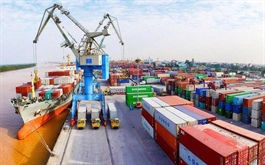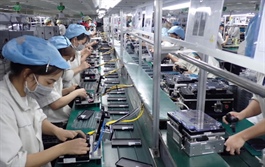Evaluating German-Vietnamese economic relations
Evaluating German-Vietnamese economic relations
In 2022, Vietnam and Germany will look back on 47 years of diplomatic relations, during which they have maintained historically solid and close connections. The two countries have come together to form strong ties since 1975. Today, there are around 430 German companies in Vietnam.
In addition to major players such as Siemens, Adidas and Bosch, small- and medium-sized German enterprises have discovered Vietnam as a promising market for investment.
More than four-fifths of German investment projects are in the industrial, software, and telecommunications sectors. As a growing middle-income country, Vietnam is hungry for energy. German technology leads the world in renewable energy, smart grids, and green buildings.
The most important question, however, remains the financing of joint projects. Participating in tenders in Vietnam is not always easy. However, opportunities are opening up for the German economy, especially with international donor organisations and with the ratification of the EU-Vietnam Free Trade Agreement (EVFTA).
The good relations were intensified once again with the Hanoi Declaration, which was inked in 2011. In this agreement, both countries committed to strategic cooperation in political dialogue, trade, development, the rule of law, environmental protection, culture, and education.
One consequence of the declaration is the “German House” in Ho Chi Minh City, completed in 2017. This building is a beacon project for Germany’s culture and economy in Vietnam and beyond. Another milestone in the relationship is the Vietnamese German University, founded in 2008, which combines academic education with practical aspects. The university moved into its new, modern campus earlier this year.
Germany is by far Vietnam’s most important European trading partner. The bilateral trade volume amounted to over $11.13 billion last year. However, there is much room for improvement, especially with the EVFTA, and Germany and Vietnam need to intensify their relations.
Over many years, the top German export goods are automobiles and machinery, which account for 60 per cent of Germany’s total export volume to Vietnam. Vietnam has also become Germany’s largest trading partner in ASEAN, and the fourth-largest trading partner in Asia (after China, Japan, and South Korea) in 2020, according to the General Statistics Office.
Germany ranks third in the EU with over 400 valid projects in the field of investment. In the future, Vietnam is expected to be an ideal investment hub for German businesses since the country holds many opportunities and development potential regarding the China+1 trend. Since China is struggling with its anti-pandemic strategy, the probability is high that Vietnam will be even more attractive to German investors as a safe haven.
However, some German companies are still hesitant to invest in Vietnam due to limitations in the auxiliary industry and the domestic supply chain. Vietnam needs to improve this situation and address the outstanding infrastructure challenges to take advantage of the trend to look for alternatives to China.
Business today is not a one-way street with Europe as the driving force. Germany has become an important destination for Vietnamese investors. Vietnam currently has 41 investment projects in Germany worth more than $218 million in finance, banking, IT, restaurants, and hotels. Vietnam and Germany are expecting investment protection to provide a further boost to bilateral economic relations.
In addition to the pandemic situation, which is still causing uncertainty in parts of the world, there is ongoing conflict in Ukraine. Globally, the increasing debt of many leading economies, growing state intervention, emerging criticism of globalisation and free markets, further shortages, and price increases for goods and services threaten all countries.
In this environment, Vietnam has to find its way to remain an attractive destination for German businesses. But the conditions are good: Vietnam remains neutral regarding political positioning. In terms of economic policy, the country is building on the path it has taken before. The economic foundation remains solid and can serve as a suitable condition for weathering the storm.
A firm commitment to free trade is of utmost importance. Furthermore, a healthy, manageable national budget (debt-to-GDP ratio of 43.7 per cent) and an investor-friendly economic climate are significant elements to retaining foreign investor interest.
Vietnam shows the strengths of a liberal-oriented economic policy, in contrast to the interventionist policy that dominates worldwide. Nevertheless, these favourable conditions need to be worked on continuously. Vietnam has to accelerate economic restructuring in association with renovating the growth model based on innovation and improving its digital financial platform.
Finally, it is also worth mentioning that there are other German actors in Vietnam beyond business. Among them are the Goethe Institute, the German Academic Exchange Service, the German Development Agency, and the Friedrich Naumann Foundation. All of them are represented in Vietnam by many projects.
Around 170,000 Vietnamese live in Germany and are well integrated into German society. In Vietnam itself, there are around 100,000 Vietnamese who speak German. Overall, the building blocks for a closer working relationship are in place. Germans and Vietnamese should work on intensifying bilateral cooperation.
Germany can see that since doi moi, Vietnam’s image has improved tremendously. Vietnam is indeed on the way to being an industrialised nation. It is an excellent place to invest and, I can say personally, a great place to live.






















